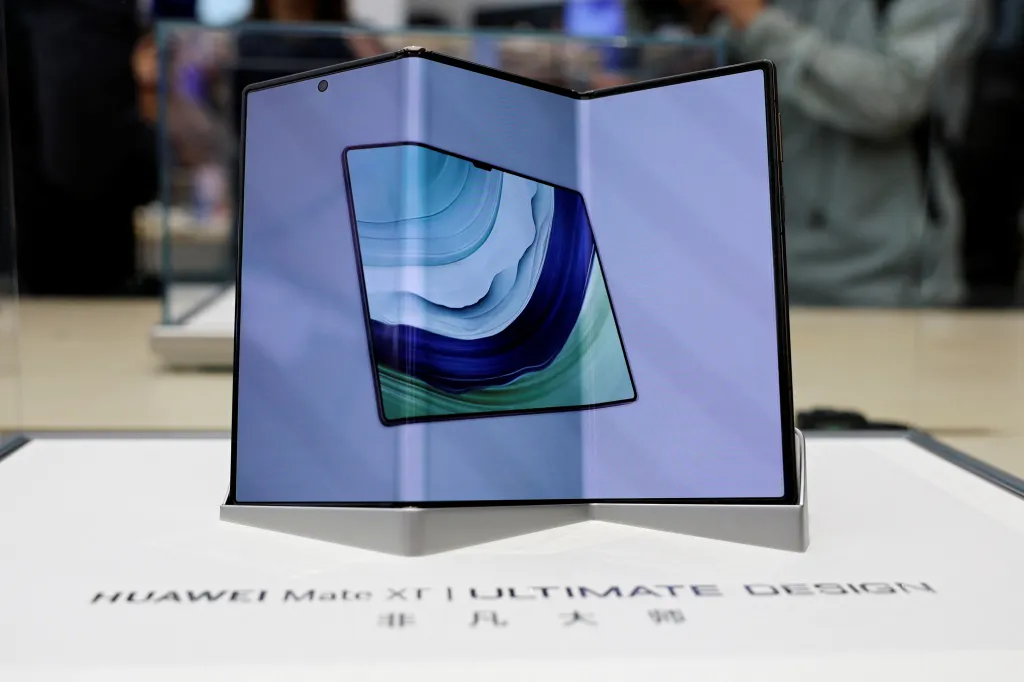Chinese smartphone company Huawei announced on Tuesday that its new trifold smartphone will be priced at over $2,800.
Pre-orders for the device began on Saturday, with in-store sales set to commence on September 20—the same day Apple’s iPhone 16 series is scheduled to hit stores, including in China.
On Monday in the U.S., Apple revealed that the iPhone 16 Pro Max will start at $1,199, while the iPhone 16 will be priced at $799.
Pre-orders for these devices will begin on Friday, with official sales also starting on September 20.
Apple stated that the first batch of its Apple Intelligence AI features will be available in a free software update next month.
These new functions will be accessible to iPhone 16 users as well as those using the iPhone 15 Pro and Pro Max.
Huawei’s Mate XT, also equipped with artificial intelligence features like text translation and cloud-based content generation, was introduced during Tuesday’s presentation.
Richard Yu, Huawei’s executive director and chairman of the board of directors for the consumer business group, expressed pride in the new release.
“We have spent five years striving for this,” Yu said, according to his remarks in Mandarin.
The Mate XT is available in red and black, with three storage options, and is priced between 19,999 yuan and 23,999 yuan ($2,809 to $3,371).
When unfolded, the device is 3.6 millimeters thick and features a 10.2-inch screen. It can display content on one, two, or three screens simultaneously and comes with a foldable keyboard. Its battery is 1.9 millimeters thick.
As of midday Tuesday, more than 3.5 million people had pre-ordered Huawei’s trifold Mate XT smartphone, according to the company’s website. By the end of the launch event, the number of pre-orders surpassed 4 million.

Apple also announced a new A18 chip for its latest iPhones, which uses cutting-edge 3-nanometer technology.
The company claimed this innovation would make the iPhone 16 considerably faster than its predecessor, the iPhone 12.
However, Huawei did not mention any new chip advancements during the Mate XT launch event.
The company introduced its tri-fold Mate XT on Tuesday, aiming to regain a strong foothold in the smartphone market, which took a significant hit after the U.S. imposed sanctions in 2019.
In October 2022, the U.S. expanded these sanctions, placing further restrictions on American sales of advanced chips to Chinese businesses.
Despite these setbacks, Huawei made a quiet comeback in late August 2023, releasing the Mate 60 Pro. Analysis by TechInsights revealed that the Mate 60 Pro is powered by a chip manufactured using a 7-nanometer process by Chinese chipmaker SMIC.
During Tuesday’s launch, Yu emphasized that the company never gave up, despite facing four rounds of sanctions.
Unlike last year’s product launch, where details about the Mate 60 Pro or its reported chip advancements were withheld, this year’s event prominently featured the Mate XT’s specifications and pricing.
Huawei’s technological strides have helped increase sales in China, despite the sluggish consumer spending.
Apple, meanwhile, dropped out of the list of the top five smartphone vendors in China during the second quarter of this year, according to data from Canalys. It was the first time that all five top spots were occupied by domestic players.
Huawei ranked fourth by market share, shipping 10.6 million smartphones, according to Canalys. While the firm only reported shipments for the top five vendors, Apple shipped 10 million phones in the first quarter.
Although Huawei and its Chinese competitors already sell folding and flip phones, Apple has yet to enter that market segment.
